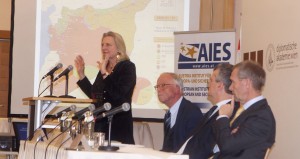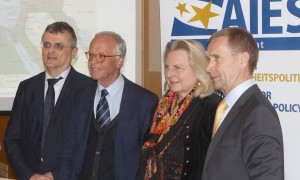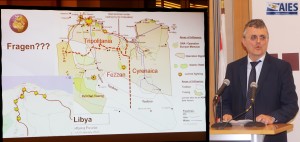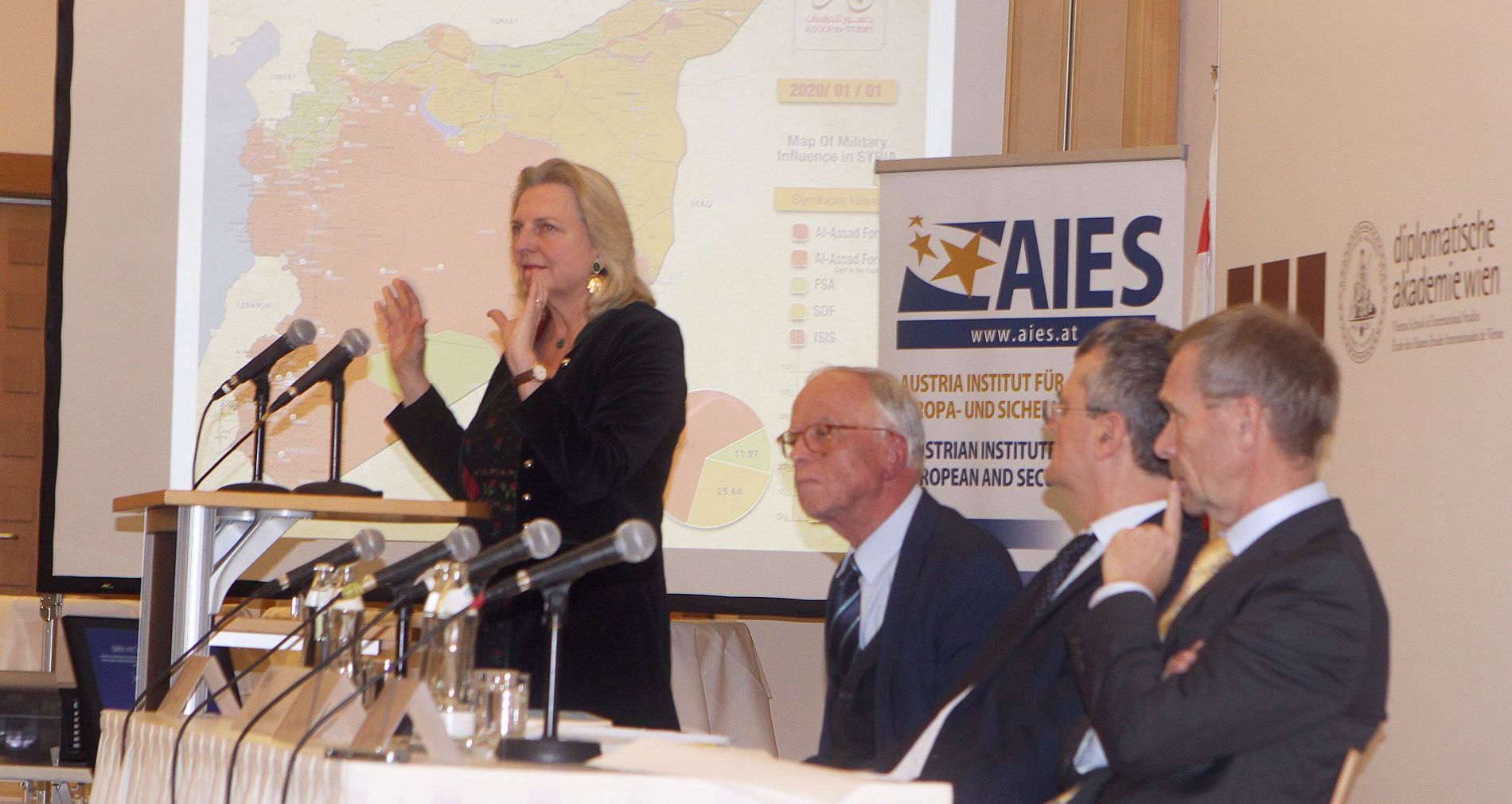On January 21, a high-caliber panel discussion took place in the Festssal of the Vienna Diplomatic Academy, whose participants cast a concentrated and welcome spotlight on Austria’s expertise in the Middle East, which is valued more abroad than in this country. Former Federal Minister for Europe, Integration and Foreign Affairs Karin Kneissl, Libya expert, Chairman of the Advisory Board of the National Council on U.S.-Libya Relations and former Austrian military attaché in Tunis and Tripoli Wolfgang Pusztai, and Brigadier Walter Feichtinger, Head of the Institute for Peacekeeping and Conflict Management at the Austrian Armed Forces, accepted an invitation from the Austrian Institute for European and Security Policy (AIES), headed by former Minister of Defense Werner Fasslabend.
 Moderated by Werner Fasslabend, Karin Kneissl first gave a historically based outline of the upheavals in the MENA region (Middle-East/North Africa). This ranged from the British/French/Italian colonial period, which still has an impact today, the fateful Skykes/Picot Agreement after the First World War, to the far-reaching US Iraq War of 2003, the Arab Spring – for which 2.0 is still pending – to the “Daesh” (IS) caliphate and its territorial fight in Iraq and Syria. In response to questions about the future of the states in this arc of conflict and crisis, Kneissl is convinced that it is primarily the increasingly burning social question that will trigger further upheavals or “classic” revolutions. “How will I feed my family next year? How are we going to get by with increasingly worthless money and often soaring food and fuel prices?” This is of far more interest to the demographically growing masses than – as in Iran – the game between so-called reformers and hardliners, the death of a general (Soleimani) at the hands of the USA – which Kneissl considers to be a strategic mistake – or the old Shia-Sunni or urban-rural dichotomy. In Egypt alone, 400,000 new job seekers enter the labor market every time they graduate from school. They don’t care whether President Al-Sissi in Libya supports General Haftar∞ they are angry that they apparently have no opportunities while the elites and military can “fix it” and line their own pockets and those of their clans. And that applies from Algeria to Iran.
Moderated by Werner Fasslabend, Karin Kneissl first gave a historically based outline of the upheavals in the MENA region (Middle-East/North Africa). This ranged from the British/French/Italian colonial period, which still has an impact today, the fateful Skykes/Picot Agreement after the First World War, to the far-reaching US Iraq War of 2003, the Arab Spring – for which 2.0 is still pending – to the “Daesh” (IS) caliphate and its territorial fight in Iraq and Syria. In response to questions about the future of the states in this arc of conflict and crisis, Kneissl is convinced that it is primarily the increasingly burning social question that will trigger further upheavals or “classic” revolutions. “How will I feed my family next year? How are we going to get by with increasingly worthless money and often soaring food and fuel prices?” This is of far more interest to the demographically growing masses than – as in Iran – the game between so-called reformers and hardliners, the death of a general (Soleimani) at the hands of the USA – which Kneissl considers to be a strategic mistake – or the old Shia-Sunni or urban-rural dichotomy. In Egypt alone, 400,000 new job seekers enter the labor market every time they graduate from school. They don’t care whether President Al-Sissi in Libya supports General Haftar∞ they are angry that they apparently have no opportunities while the elites and military can “fix it” and line their own pockets and those of their clans. And that applies from Algeria to Iran.
 Kneissl takes a sobering or sobering view of the role of Europe and the EU in this context. Unlike the “evolved” nation states of Russia, China or the USA, for which (major) power politics or geopolitical considerations are “normal” tools, Europe as a confederation of states – with former colonial powers such as France still acting as such – was “designed” completely without geopolitics as a power factor or weight. Cold reality is making itself felt, but Europe still does not know how to react to it as a bloc primarily geared towards market organization: The world around us, however, consists of sovereign and militarily strong states led by “men for the rough and tumble” such as Putin, Erdoğan, Li Xinping and Trump. Europe must realize that it is “only” a historical exception, by no means the vanguard of the world peace that will definitely and certainly come. As far as the MENA region is concerned, Kneissl sees Russia as the big winner, keeping channels of communication open to all sides and sitting at the table in every crisis region with a relatively small commitment. Thanks to Russia’s involvement, Syria’s Assad and his family can hope to rule the whole of Syria again at some point in the future. Speaking of dialog: Not wanting to sit down or meet with this or that actor for ideological or “sanitary” reasons, as some European state chancelleries do, is “infantile at best – but not diplomacy”, according to Kneissl. Diplomacy means always talking to everyone everywhere. Wolfgang Pusztai considers the recent Berlin Libya conference to be better than if it had not taken place, but criticizes that the bar should have been set lower. At the end of the conference, it was already known that while the ceasefire and truce were being discussed, the Turkish leadership was simultaneously flying over 2,000 Turkmen fighters from Syria to Tripoli using A400Ms and an airline belonging to the Tripoli government. According to Pusztai, these fighters had already begun a first relief attack against General Haftar’s LNA troops on the day of the discussion round.
Kneissl takes a sobering or sobering view of the role of Europe and the EU in this context. Unlike the “evolved” nation states of Russia, China or the USA, for which (major) power politics or geopolitical considerations are “normal” tools, Europe as a confederation of states – with former colonial powers such as France still acting as such – was “designed” completely without geopolitics as a power factor or weight. Cold reality is making itself felt, but Europe still does not know how to react to it as a bloc primarily geared towards market organization: The world around us, however, consists of sovereign and militarily strong states led by “men for the rough and tumble” such as Putin, Erdoğan, Li Xinping and Trump. Europe must realize that it is “only” a historical exception, by no means the vanguard of the world peace that will definitely and certainly come. As far as the MENA region is concerned, Kneissl sees Russia as the big winner, keeping channels of communication open to all sides and sitting at the table in every crisis region with a relatively small commitment. Thanks to Russia’s involvement, Syria’s Assad and his family can hope to rule the whole of Syria again at some point in the future. Speaking of dialog: Not wanting to sit down or meet with this or that actor for ideological or “sanitary” reasons, as some European state chancelleries do, is “infantile at best – but not diplomacy”, according to Kneissl. Diplomacy means always talking to everyone everywhere. Wolfgang Pusztai considers the recent Berlin Libya conference to be better than if it had not taken place, but criticizes that the bar should have been set lower. At the end of the conference, it was already known that while the ceasefire and truce were being discussed, the Turkish leadership was simultaneously flying over 2,000 Turkmen fighters from Syria to Tripoli using A400Ms and an airline belonging to the Tripoli government. According to Pusztai, these fighters had already begun a first relief attack against General Haftar’s LNA troops on the day of the discussion round.
 Unctuous appeals would not change the fact that one of Haftar’s motives in the offensive on the capital is that the majority of mainland oil wells are located in eastern Libya but the revenues from them are channelled through the central bank (of the Sarraj government) in Tripoli. In the meantime, the Turks had deployed HAWK anti-aircraft missiles at the airports in Misrata and Tripoli, which could largely neutralize the old MiGs of his air force, Haftar’s previous mainstay. In order to suppress those older HAWK radars, Haftar, standing eight kilometers from the center of Tripoli, would again need the Emirates or Egypt – should the fighting flare up again. And Europe would already be weakened by the different approaches of France and Italy alone. That is what states have, interests and not friends. Those of Paris would be because of Islamist militias and terrorists in southern Libya (Haftar region) versus the French-speaking sub-Saharan countries, while Rome would be involved because of the (mostly African) migration flows across the Mediterranean (so-called coast guard of the unelected GNA government in Tripoli). As much as the people there and neighboring Europe wanted peace, Pusztai could not offer any really encouraging prospects. Brigadier Feichtinger recalled that the collapse of the Soviet empire and its alliance structures was followed by two decades of a unipolar order in which the USA – sometimes with the UN, sometimes on its own – took on the role of guardian of a global order. Under Bush, they had overstretched themselves, under Obama they tried to continue playing this role, but more cautiously and with more restraint. And under Trump, they “crashed” out of it. The role of guardian of the world order is expensive, or rather it has become too expensive for the section of US voters who put Trump in office with “America First”. In addition, Trump believes that assassinations and killings allow for quicker successes than years of own troops under fire somewhere overseas – especially in connection with his re-election bid. The audience of around 100 included a number of active and retired army officers, numerous diplomatic students and embassy staff – and Militär Aktuell. Generally audible was more anti-Americanism paired with understanding for Putin’s Russia as a factor. In one of those “co-speeches” held to the annoyance of every moderator, Europe’s problem versus geopolitics was nevertheless well summed up: the EU has no sense of its external border and where it should effectively end. Yes, it acts as if questions of how to deal stringently with Russia or China are outdated great power politics from the 19th century. But with Russia’s actions since 2014 and the upheavals in the Arab world and the migration crisis, which is still unresolved in reality, we have learned through domestic political pain (AfD, Salvini, FPÖ, Orban etc.) that there are indeed limits and that you cannot bravely hug half the world to your bosom and at the same time “impose” democracy and a market economy from above.
Unctuous appeals would not change the fact that one of Haftar’s motives in the offensive on the capital is that the majority of mainland oil wells are located in eastern Libya but the revenues from them are channelled through the central bank (of the Sarraj government) in Tripoli. In the meantime, the Turks had deployed HAWK anti-aircraft missiles at the airports in Misrata and Tripoli, which could largely neutralize the old MiGs of his air force, Haftar’s previous mainstay. In order to suppress those older HAWK radars, Haftar, standing eight kilometers from the center of Tripoli, would again need the Emirates or Egypt – should the fighting flare up again. And Europe would already be weakened by the different approaches of France and Italy alone. That is what states have, interests and not friends. Those of Paris would be because of Islamist militias and terrorists in southern Libya (Haftar region) versus the French-speaking sub-Saharan countries, while Rome would be involved because of the (mostly African) migration flows across the Mediterranean (so-called coast guard of the unelected GNA government in Tripoli). As much as the people there and neighboring Europe wanted peace, Pusztai could not offer any really encouraging prospects. Brigadier Feichtinger recalled that the collapse of the Soviet empire and its alliance structures was followed by two decades of a unipolar order in which the USA – sometimes with the UN, sometimes on its own – took on the role of guardian of a global order. Under Bush, they had overstretched themselves, under Obama they tried to continue playing this role, but more cautiously and with more restraint. And under Trump, they “crashed” out of it. The role of guardian of the world order is expensive, or rather it has become too expensive for the section of US voters who put Trump in office with “America First”. In addition, Trump believes that assassinations and killings allow for quicker successes than years of own troops under fire somewhere overseas – especially in connection with his re-election bid. The audience of around 100 included a number of active and retired army officers, numerous diplomatic students and embassy staff – and Militär Aktuell. Generally audible was more anti-Americanism paired with understanding for Putin’s Russia as a factor. In one of those “co-speeches” held to the annoyance of every moderator, Europe’s problem versus geopolitics was nevertheless well summed up: the EU has no sense of its external border and where it should effectively end. Yes, it acts as if questions of how to deal stringently with Russia or China are outdated great power politics from the 19th century. But with Russia’s actions since 2014 and the upheavals in the Arab world and the migration crisis, which is still unresolved in reality, we have learned through domestic political pain (AfD, Salvini, FPÖ, Orban etc.) that there are indeed limits and that you cannot bravely hug half the world to your bosom and at the same time “impose” democracy and a market economy from above.










